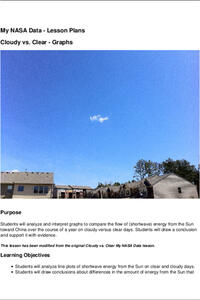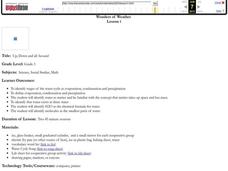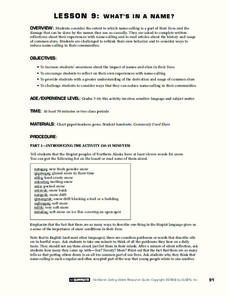Beyond Benign
The Big Melt: Arctic Ice Caps
Are the Arctic ice caps really melting out of existence? Junior climatologists examine the statistics of ice decline through four math-based lessons. Each activity incorporates data, climate information, and environmental impact into an...
Nevada Outdoor School
Let It Snow! Let It Melt!
Winter weather offers a great opportunity to teach young scientists about the states of matter. This activity-based lesson includes a range of learning experiences, from experimenting with the rate at which ice melts...
Curated OER
Changing Planet: Melting Glaciers
Resource links to a video, satellite images, data, and photographs of glaciers provide emerging earth scientists the opportunity to examine how the ice has been retreating over the years. A data table is included for pupils to record...
Space Awareness
The Big Meltdown
Explore the world (our world) of melting ice caps. Why are these caps melting? What is the effect of melting ice caps? Dive into the ever-present issue of global warming with a resource that has learners looking at data and participating...
NASA
Cloudy vs. Clear - Graphs
Explore the link between solar energy and cloud cover using real data from NASA from China! Future climatologists analyze and interpret graphs of solar energy on clear and cloudy days using a literacy cube. Investigators draw conclusions...
NOAA
Exploring Potential Human Impacts
Arctic sea ice reflects 80 percent of sunlight, striking it back into space; with sea ice melting, the world's oceans become warmer, which furthers global warming. These activities explore how humans are impacting ecosystems around the...
Curated OER
Glaciers: Then and Now
A large data table is given to your elementary earth scientists in which they record observations that they make while viewing pictures of Alaskan glaciers. They compare and contrast recent photos with older photos. Hold a discussion...
Curated OER
Ice Melting
Students design investigations to test various materials to prevent heat gain in frozen water. The task assess students' knowledge of scientific inquiry including the following skills: observation, data collection, measurement,...
Polar Trec
Foraging for Fish in a Melting Arctic
How much do you know about the black guillemot of the Arctic region? With great background information, images, and a quick discussion, the class will learn all about the plight of the foraging seabird as they play a fun game. First,...
Virginia Department of Education
States of Matter
Scientists have been studying exothermic reactions before they were cool. The lesson begins with a discussion and a demonstration of heat curves. Scholars then determine the heat of fusion of ice and the heat needed to...
Center for Learning in Action
Water – Changing States (Part 2)
Here is part two of a two-part lesson in which scholars investigate the changing states of water—liquid, solid, and gas—and how energy from heat changes its molecules. With grand conversation, two demonstrations, and one hands-on...
Curated OER
Ice Ain't Easy
Students are introduced to the laws of thermodynamics. The 1st law of thermodynamics states that the energy must be conserved when two objects of different temperatures come in contact. If one object gains energy, the other object must...
Curated OER
Reflecting on Reflectivity
Learners plan and construct a "mini-lab" to measure the reflectivity of different earth surfaces. They measure reflectivity of materials, including ice, soil, rocks, etc., and then extrapolate from what they have learned to consider the...
Curated OER
Wonders of Weather
Fourth graders complete activities to study weather and the water cycle. In this water cycle lesson, 4th graders observe a demonstration of the three stages of water. Students work in groups to complete a water cycle lab activity....
Curated OER
What's in a Name?
Students examine how name-calling is a part of their lives and how it affects others. They write reflections of times in their lives when name calling and slurs have been involved. Also, they read articles that discuss the use of slurs...














